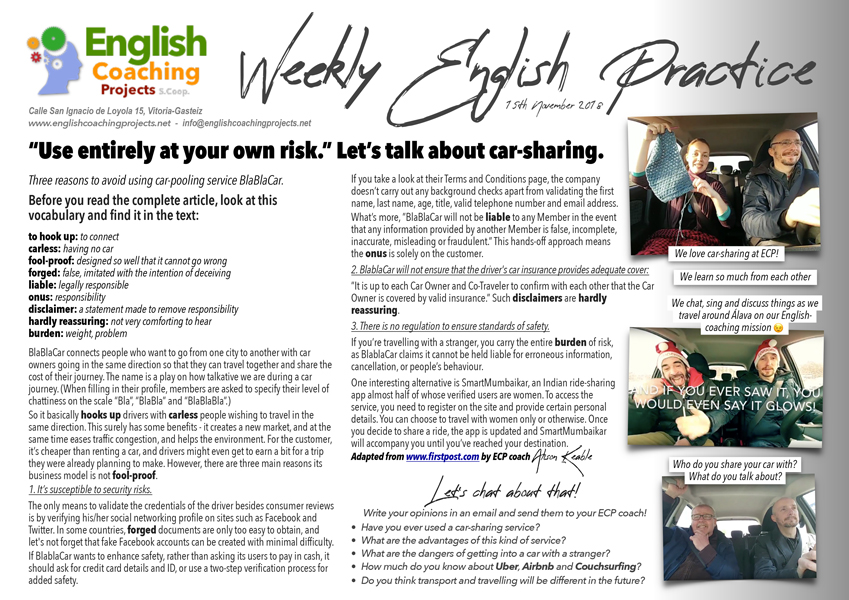ECP coach Ali talks about car-sharing
Click on the image to download the pdf
Three reasons to avoid using car-pooling service BlaBlaCar
Before you read the complete article, look at this vocabulary and find it in the text:
to hook up: to connect
carless: having no car
fool-proof: designed so well that it cannot go wrong
forged: false, imitated with the intention of deceiving
liable: legally responsible
onus: responsibility
disclaimer: a statement made to remove responsibility
hardly reassuring: not very comforting to hear
burden: weight, problem
Listen to the audio
BlaBlaCar connects people who want to go from one city to another with car owners going in the same direction so that they can travel together and share the cost of their journey. The name is a play on how talkative we are during a car journey. (When filling in their profile, members are asked to specify their level of chattiness on the scale “Bla”, “BlaBla” and “BlaBlaBla”.)
So it basically hooks up drivers with carless people wishing to travel in the same direction. This surely has some benefits – it creates a new market, and at the same time eases traffic congestion, and helps the environment. For the customer, it’s cheaper than renting a car, and drivers might even get to earn a bit for a trip they were already planning to make. However, there are three main reasons its business model is not fool-proof.
1. It’s susceptible to security risks.
The only means to validate the credentials of the driver besides consumer reviews is by verifying his/her social networking profile on sites such as Facebook and Twitter. In some countries, forged documents are only too easy to obtain, and let’s not forget that fake Facebook accounts can be created with minimal difficulty.
If BlablaCar wants to enhance safety, rather than asking its users to pay in cash, it should ask for credit card details and ID, or use a two-step verification process for added safety.
If you take a look at their Terms and Conditions page, the company doesn’t carry out any background checks apart from validating the first name, last name, age, title, valid telephone number and email address.
What’s more, ”BlaBlaCar will not be liable to any Member in the event that any information provided by another Member is false, incomplete, inaccurate, misleading or fraudulent.” This hands-off approach means the onus is solely on the customer.
2. BlablaCar will not ensure that the driver’s car insurance provides adequate cover:
”It is up to each Car Owner and Co-Traveler to confirm with each other that the Car Owner is covered by valid insurance.” Such disclaimers are hardly reassuring.
3. There is no regulation to ensure standards of safety.
If you’re travelling with a stranger, you carry the entire burden of risk, as BlablaCar claims it cannot be held liable for erroneous information, cancellation, or people’s behaviour.
One interesting alternative is SmartMumbaikar, an Indian ride-sharing app almost half of whose verified users are women. To access the service, you need to register on the site and provide certain personal details. You can choose to travel with women only or otherwise. Once you decide to share a ride, the app is updated and SmartMumbaikar will accompany you until you’ve reached your destination.
Adapted from www.firstpost.com by ECP coach Alison Keable
Let’s chat about that!
Write your opinions in an email and send them to your ECP coach!
- Have you ever used a car-sharing service?
- What are the advantages of this kind of service?
- What are the dangers of getting into a car with a stranger?
- How much do you know about Uber, Airbnb and Couchsurfing?
- Do you think transport and travelling will be different in the future?


